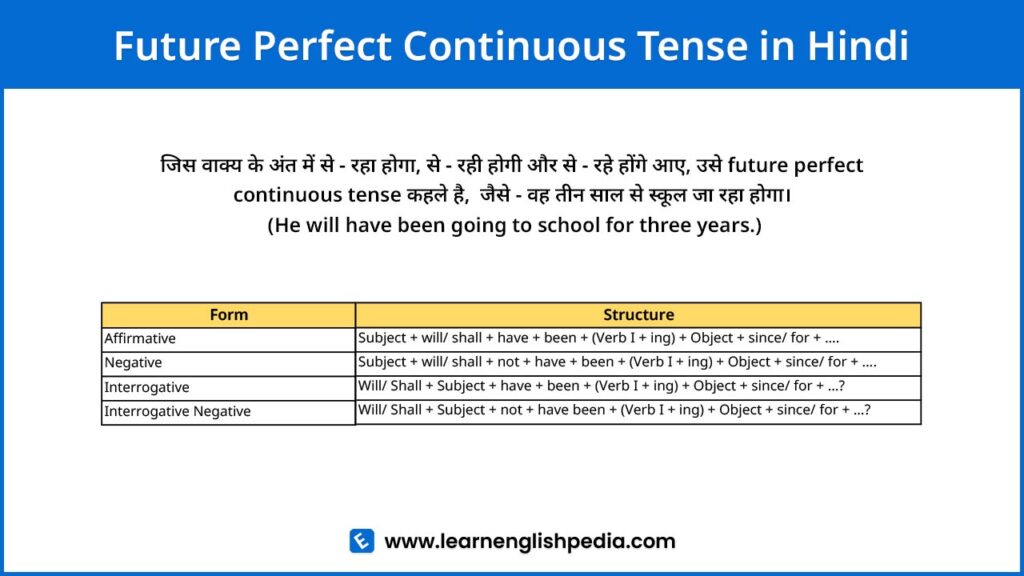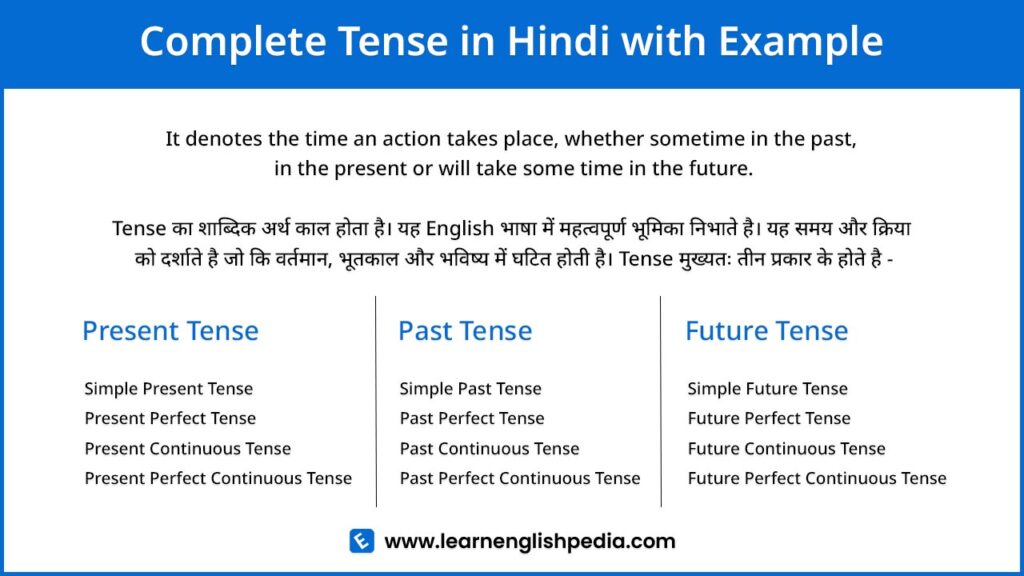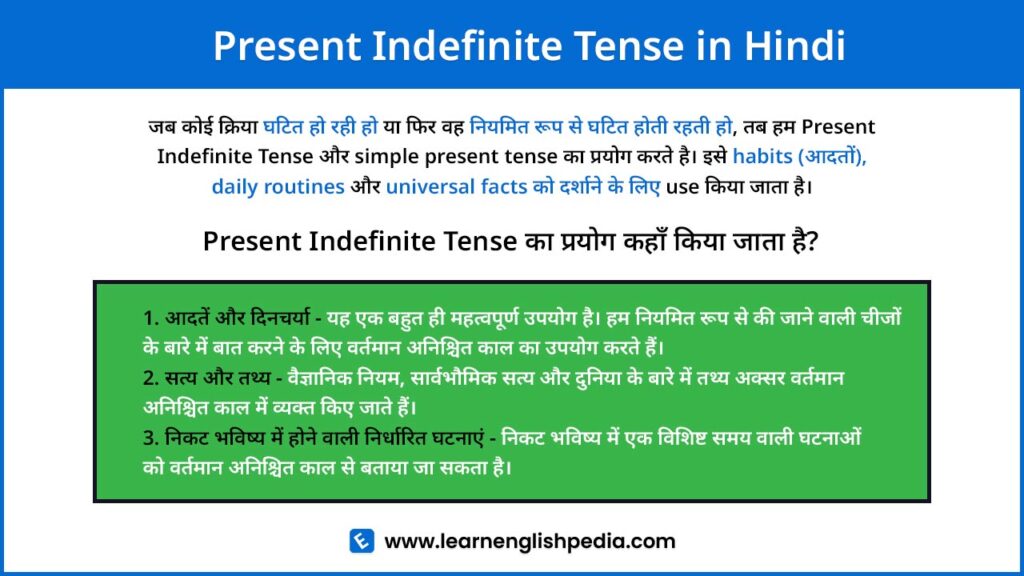इस article में हम Future perfect continuous tense in hindi के बारे में जानेंगे। हम जानेंगे कि future perfect continuous tense की पहचान क्या है, उसका structure क्या है और उसके उदाहरण क्या क्या है?
Future Perfect Continuous Tense in Hindi
जिस वाक्य के अंत में से – रहा होगा, से – रही होगी और से – रहे होंगे आए, उसे future perfect continuous tense कहले है, जैसे – वह तीन साल से स्कूल जा रहा होगा। (He will have been going to school for three years.)

Affirmative Forms –
Future perfect tense के affirmative sentences में verb की 1st form के साथ ‘ing’ का प्रयोग किया जाता है। इसमें first person pronoun के साथ shall have been का प्रयोग होता है और अन्य सभी persons के साथ will have been का प्रयोग किया जाता है।
Structure –
Subject + will/ shall + have + been + (Verb I + ing) + Object + since/ for + ….
Example –
| I shall have been going to school since Monday. | मैं सोमवार से स्कूल जा रहा हूँगा। |
| We shall have been going to school for a week. | हम एक हफ्ते के लिए स्कूल जा रहे होंगे। |
| He will have been going to school for three years. | वह तीन साल के लिए स्कूल जा रहा होगा। |
| She will have been going to school since morning. | वह सुबह से स्कूल जा रही होगी। |
| You will have been going to school since 9 O’clock. | आप 9 बजे से स्कूल जा रहे होंगे। |
| They will have been going to school since January 2005. | वे जनवरी 2005 से स्कूल जा रहे होंगे। |
Negative Forms –
Future perfect continuous tense के negative sentences में ‘not’ का प्रयोग हमेशा पहली helping verb shall/will के बाद किया जाता है।
Structure –
Subject + will/ shall + not + have + been + (Verb I + ing) + Object + since/ for + ….
Example –
| I shall not have been going to school since Monday. | मैं सोमवार से स्कूल नहीं जा रहा हूँगा। |
| We shall not have been going to school for a week. | हम एक हफ्ते के लिए स्कूल नहीं जा रहे होंगे। |
| He will not have been going to school for three years. | वह तीन साल से स्कूल नहीं जा रहा होगा। |
| She will not have been going to school since morning. | वह सुबह से स्कूल नहीं जा रही होगी। |
| You will not have been going to school since 9 O’clock. | आप 9 बजे के बाद से स्कूल नहीं जा रहे होंगे। |
| They will not have been going to school since January 2005. | वे जनवरी 2005 से स्कूल नहीं जा रहे होंगे। |
Also Read – Adjectives that start with B
Interrogative Forms –
Future perfect continuous tense के interrogative sentences में ‘will/shall’ का प्रयोग हमेशा subject के पहले किया जाता है।
Structure –
Will/ Shall + Subject + have + been + (Verb I + ing) + Object + since/ for + …?
Example –
| Shall I have been going to school since Monday? | क्या मैं सोमवार से स्कूल जा रहा हूँगा? |
| Shall we have been going to school for a week? | क्या हम एक हफ्ते के लिए स्कूल जा रहे होंगे? |
| Will he have been going to school for three years? | क्या वह तीन साल से स्कूल जा रहा होगा? |
| Will she have been going to school since morning? | क्या वह सुबह से स्कूल जा रही होगी? |
| Will you have been going to school since 9 O’clock? | क्या आप 9 बजे से स्कूल जा रहे होंगे? |
| Will they have been going to school since January 2005? | क्या वे जनवरी 2005 से स्कूल जा रहे होंगे? |
Interrogative Negative Forms –
Future perfect continuous tense के interrogative negative sentences में ‘will/shall’ का प्रयोग subject से पहले और subject के बाद में ‘not’ का प्रयोग और have been के साथ verb की 1st form + ing का प्रयोग होता है।
Structure –
Will/ Shall + Subject + not + have been + (Verb I + ing) + Object + since/ for + …?
Example –
| Shall I not have been going to school since Monday? | क्या मैं सोमवार से स्कूल नहीं जा रहा हूँगा? |
| Shall we not have been going to school for a week? | क्या हम एक हफ्ते के लिए स्कूल नहीं जा रहे होंगे? |
| Will he not have been going to school for three years? | क्या वह तीन साल से स्कूल नहीं जा रहा होगा? |
| Will she not have been going to school since morning? | क्या वह सुबह से स्कूल नहीं जा रही होगी? |
| Will you not have been going to school since 9 O’clock? | क्या आप 9 बजे के बाद से स्कूल नहीं जा रहे होंगे? |
| Will they not have been going to school since January 2005? | क्या वे जनवरी 2005 से स्कूल नहीं जा रहे होंगे? |


